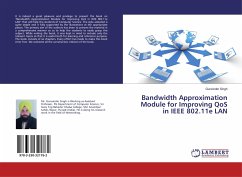
Performance Optimization of Wireless Networks
for Small and Medium Enterprises
Versandkostenfrei!
Versandfertig in 6-10 Tagen
33,99 €
inkl. MwSt.

PAYBACK Punkte
17 °P sammeln!
Small and Medium Enterprises (SMEs) setup wireless networks in order to make the process of communicating and sharing information resources easier. SMEs implement wireless networks, because it's easy, fast and cheaper to implement. However, most of SMEs grow rapidly and tend to hire more employees to cope with business growth. The additional employees come with network devices i.e., PCs, PDAs, iPads, etc., which increases SMEs' bandwidth demand. As a result, SMEs spectrum bandwidth allocation rapidly dwindles, giving rise to degraded quality of services (QoS) such as high network latency, link...
Small and Medium Enterprises (SMEs) setup wireless networks in order to make the process of communicating and sharing information resources easier. SMEs implement wireless networks, because it's easy, fast and cheaper to implement. However, most of SMEs grow rapidly and tend to hire more employees to cope with business growth. The additional employees come with network devices i.e., PCs, PDAs, iPads, etc., which increases SMEs' bandwidth demand. As a result, SMEs spectrum bandwidth allocation rapidly dwindles, giving rise to degraded quality of services (QoS) such as high network latency, link congestion and high number of lost packets. In order to enhance spectrum bandwidth allocation that would cater for additional network devices within the SMEs, we have integrated a transferable payoff coalitional game theory and standard-Dijkstra algorithm, to produce the desired QoS. This scheme involves modelling spectrum bandwidth allocation objective as transferable payoff coalitional game, followed by finding the shortest path with the least link load and interference between the source and destination nodes.












